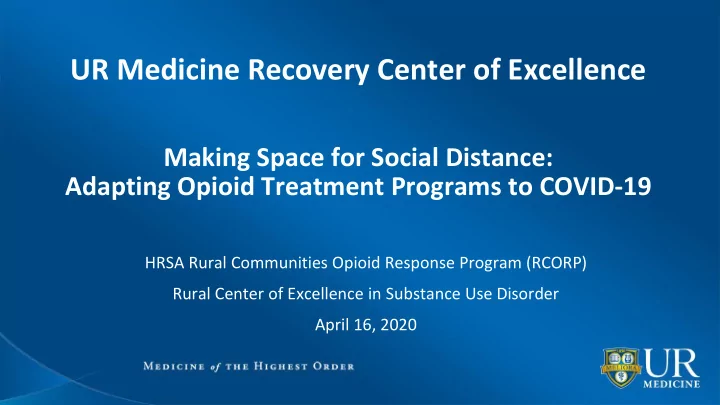

UR Medicine Recovery Center of Excellence Making Space for Social Distance: Adapting Opioid Treatment Programs to COVID-19 HRSA Rural Communities Opioid Response Program (RCORP) Rural Center of Excellence in Substance Use Disorder April 16, 2020
UR Medicine Recovery Center of Excellence: Steering Committee Steering Committee (from top left): Ken Conner, PhD (Identification Core) Daniel Maeng, PhD (Evaluation Core) Michele Lawrence (Co-PI; Adaptation & Implementation) Gloria Baciewicz, MD (Co-PI; Substance Use Disorder) Natalie Mai-Dixon (Finance) Patrick Seche, CASAC (SUD, Methadone, Community Relations) Wendi Cross, PhD (Adult Education & Dissemination) Christine Lasher (Center Director) Not shown: Hochang (Ben) Lee, MD (Chair, Psychiatry) 2 2
UR Medicine Recovery Center of Excellence: Aims Working to reduce the harmful effects of substance use disorder, including opioid use disorder (synthetics), through three interconnected efforts: 1. Partnering with Appalachian communities in Kentucky, New York, Ohio, and West Virginia to identify, adapt, and implement evidence-based practices 2. Testing emerging best practices in New York’s Southern Tier as communities in that region create an ecosystem of recovery 3. Synthesizing wisdom by building a storehouse of resources and providing technical assistance to rural communities across the U.S. 3 3
Presenters Itza Morales-Torres, M.S.B., CASAC Patrick Seche, M.S., CASAC 4 4
Federal and State Guidelines • • Kentucky Federal • SAMHSA (CSAT) • Dept for Behavioral Health, Developmental and • DEA (Diversion Control Division) Intellectual Disabilities • KORE • Ohio • Dept of Mental Health and Addiction Services • New York • Office of Addiction Services and Supports • West Virginia • Bureau for Behavioral Health • HELP4WV • Help & Hope WV 5 5
Recap: Adapting to Regulatory Changes • Real-time communication with both staff and patients • Health departments will be overburdened so streamline the process in advance for maintaining contact • Be ready to screen and assess over the phone; in-person should be limited to only what is required • Follow the process to seek blanket exceptions (take homes) • Understand your obligations with respect to patient privacy • Track COVID-19 expenses carefully • Be prepared to maintain reports to submit to regulatory authorities 6 6
Strong Recovery In partnership with patients, families, and the community, we promote recovery from substance use and mental health disorders through holistic, person-centered care that values diversity, teaching, and research. Our 3 clinics include: • Opioid Treatment Program • Outpatient Chemical Dependency • Adolescent and Young Adult Clinic 7 7
Recap: Managing Staff • Be ready to modify workflows • Prepare for staff shortages • Maintain lines of communication • Be prepared to address staff anxiety Strong Recovery staff on World Mental Health Day, October 2019 8 8
Then vs. Now: A Different Kind of Day at OTP to Prevent the Spread of COVID-19 Illustration by cwhrtmnn. Source Pixabay. 9 9
Recap: Preventing Spread of COVID-19 at Facility • Practice social distancing • Identify isolation space onsite for patients/staff • Plan steps to take when a person is ill or tests positive for the virus • Schedule dosing times • Prepare infrastructure for telehealth and address privacy/hacking • Look for alternatives to group therapy sessions 10 10
Delivering Medication 11 11
Recap: Delivering Medication • Move to take-home medications when possible • Consider methadone dispensing curbside or in alternative locations • Plan for maintaining medication stock with new procedures • Think about delivery of medication to quarantined or homebound patients • Provide medication safety education • Be sure to distribute naloxone kits 12 12
What Can We Do Now? Communicating with Patients • Share changes to clinic hours/days clearly • Advise about travel lockdowns, shelter-in-place, etc. • Explain about types of care: telemedicine, delivery, curbside, in-person • Teach patients about protecting medication from theft • Plan for supply of PPE needed for staff • Update patient files and confirm emergency contacts • Prepare signs/posters 13 13
Providing Essential Treatment Strong Recovery is accepting new patients, administering medication, utilizing phone and video calls for visits, and live-streaming group sessions. “It’s all very essential, because we don’t want an increase in overdoses, an increase of people going into withdrawal that require medical attention, because that will add to the stress of the health care system,” [Patrick] Seche said. Source : “ Treating Substance Abuse in the Era of Social Distancing ,” Andrew Freeman, Spectrum News , April 1,2020 14 14
Discussing Challenges and Strategies Q & A 15 15
We look forward to your input and questions! UR Medicine Recovery Center of Excellence Technical Assistance Center • Phone: 1-844-263-8762 (1-844-COE-URMC) • Email: URMedicine_Recovery@urmc.Rochester.edu Website: recoverycenterofexcellence.org Twitter: @URMC_Recovery This HRSA RCORP RCOE program is supported by the Health Resources & Services Administration (HRSA) of the US Department of Health & Human Services (HHS) as part of an award totaling $6.7M with 0% financed with non-governmental sources. The contents are those of the author(s) and do not necessarily represent the official views of, nor an endorsement by HRSA, HHS or the US Government. 16 16
Recommend
More recommend